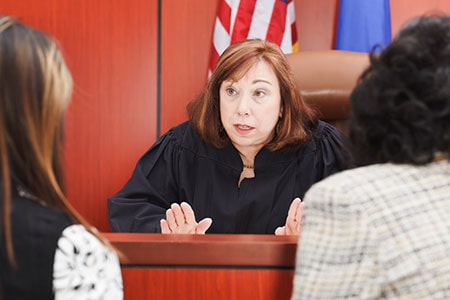Criminal Charges

- Call 911 as soon as the violence occurs. If they respond, but do not make an arrest, get the police report number, and go to the District Court commissioner in your area to press criminal charges. The commissioner will either issue a summons for the alleged abuser to appear in court or issue an arrest warrant.
- If the police see a physical injury as the result of domestic violence, they may make an arrest on the spot. If the police do not make an arrest, you should still go to the District Court commissioner. Very often, the commissioner will have a list of organizations that assist families in crisis.
Many abusers try to pressure victims to drop the charges before trial. Once charges are brought, only the prosecuting attorney may drop the charges. Often at the time of trial, the abuser and the prosecutor agree on a guilty plea. If this happens, you will not be asked to testify. However, be prepared to testify in case an agreement is not reached.
If you are the victim, there are many reasons to hire private counsel to walk you through the process. Often what happens at the temporary hearing, or the final protective order hearing can greatly impact any future criminal charges and/or divorce or custody proceedings. The terms and conditions will also be of great significance. A protective order can be in effect for one year and extended thereafter with good cause being demonstrated to the court. A violation of a protective order can result in criminal prosecution.
If you are the alleged abuser and you go to court without counsel, it may be one of the biggest mistakes you ever make.
In many criminal cases involving a husband or wife, the abuser will not be sentenced to jail, initially. The judge may choose from many sentencing options, including probation and counseling, a stay away order or restricted contact, which may be more beneficial for the entire family than sending the spouse to jail. In many cases, alcoholism or drug abuse may contribute to the abusive behavior, and the judge may order necessary treatment to help the abuser overcome his or her addiction.
Order of Protection

Do You Qualify for an Order of Protection?
To qualify for this order, you must be a “person eligible for relief.” This includes being a former or current spouse of the abuser; a person who has had a sexual relationship with and lived with the abuser for at least 90 days during the year; a person who is related to the abuser by blood or marriage and lived with the abuser for at least 90 days during the year; a vulnerable adult; or a person who has a child in common with the abuser.
You should file for a protection order as soon as possible after the abuse occurs. Please call my office to receive the latest guidance in getting the protection order as quickly as possible. Although a filing fee might be charged, it may be waived if you do not have the money. To get an Order of Protection, you must file the petition for relief and speak with a judge. The judge may grant you a temporary order, called an Ex Parte Order, which may order the abuser out of the home for up to seven days, order the abuser from contacting or harassing you at home or on the job, award temporary custody of children and set a date for the hearing when you, the abuser and all concerned parties can be present. The Ex Parte Order expires on the day of the hearing when a new order may be granted.
As stated above, in Maryland, the Court Commissioners are authorized to issue immediate protective orders until the next court business day and you will generally be able to find a commissioner 24 hours a day, evenings, weekends, and holidays by contacting your local police department so that they can direct you accordingly. In other words, if you are having an emergency, you do not have to wait till the court is open. If you are in such a situation, you should contact an attorney any time day or night. I can be reached at 410-869-3400 or via our contact page.
On the Day of the Hearing

Although it is not necessary to have an attorney represent you regarding the petition before the court, you may want to consult a lawyer to find out what options are available to you. A lawyer can tell you what choices you have and help you decide what is best for you. Call me at 410-869-3400.
If you are financially strapped, try the House of Ruth Domestic Violence Legal Clinic in Maryland provides legal assistance to victims of domestic violence. Call 410-889-0840 between 9 a.m. and 5 p.m., Monday through Friday.
Protect Yourself
If you must leave your home quickly to protect yourself from abuse, you may call the police to escort you back to your home to pick up clothing, medicine, or other necessities.
Don’t Become A Statistic
If you are being abused by a spouse or partner, contact the Maryland Commission for Women or one of the local domestic violence programs in your area. You deserve better.
According to the National Coalition Against Domestic Violence, it has been reported that every 15 seconds a woman is beaten in a domestic dispute somewhere in the United States. Domestic violence, abuse, assault and battery are all crimes that should not be treated lightly. If you are being battered by your spouse or partner, you can seek legal protection, even prosecution, whether you are married to your abuser or not. We can assist you in preserving your safety and your dignity.
